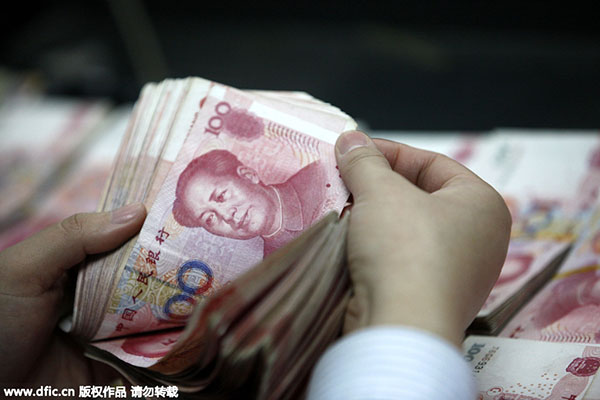New fund set to boost small firms
By Zhao Yinan (China Daily) Updated: 2015-09-02 06:50
 |
|
A Chinese clerk counts yuan banknotes at a bank in Huaibei city, East China's Anhui province, January 22, 2015.[Photo/IC] |
China plans to set up a national fund of up to 60 billion yuan ($9.4 billion) to encourage the growth of small and micro-businesses.
The fund is in addition to measures lowering the initial capital requirement for fixed-asset investment projects, a State Council executive meeting decided on Tuesday.
The central government will invest 15 billion yuan in the fund as initial capital, according to a circular released after the meeting. The remaining capital will be raised from private and State-owned companies, financial institutions and local governments.
The fund will be used mainly to "support small and micro-sized businesses in the initial stage as seed investment". The fundraising, establishment, management and revenue distribution of the fund will be conducted according to market-oriented principles.
To attract more private capital to increase the growth of small and micro-companies, private investors in the fund will be given priority over government-backed ones in receiving dividends, the circular said.
The meeting also decided to lower the initial capital requirement for fixed-asset investment projects in some sectors to reduce the threshold for such investment and encourage economic growth.
The initial capital of a fixed-asset investment project is the proportion of capital that must be paid before, or in the early stages, of a project. The capital will usually be government revenue and can help project operators to apply for bank loans.
The meeting decided to lower the initial capital for projects related to the construction of ports, inland navigation and airports from 30 percent to 25 percent.
For projects related to the construction of railways, highways and urban subways it will be lowered from 25 percent to 20 percent, and for those related to corn deep-processing projects it will be lowered from 30 percent to 20 percent.
The initial capital for projects considered significant by the central government, in addition to that for the construction of urban underground pipelines, sewage networks and parking projects, will be open to more flexible terms, the meeting decided.
- 2015 China International Fair for Investment and Trade kicks off in Xiamen
- China's commodity imports robust in Jan-Aug period
- China stocks rebound 2.92%
- 2015 China box office already past 2014 total
- China foreign trade decline widens in August
- Interview: JP Morgan's senior executive bullish on China
- Innovation, development the focus for NZ mayors
- Lives of freelancers

















